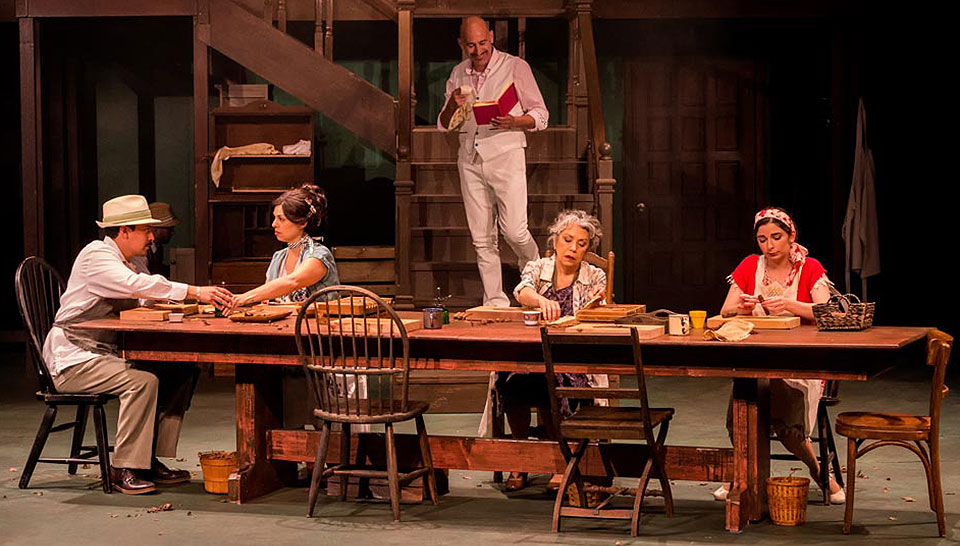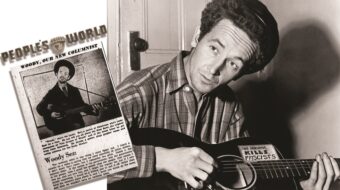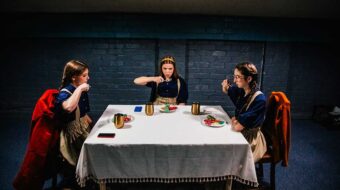
PASADENA, Calif. — It’s ironic that A Noise Within’s absorbing production of Anna in the Tropics opens, as fate would have it, while Russia is making front-page news. This is because the titular Anna is a reference to the eponymous Anna Karenina in Count Leo Tolstoy’s famed 1878 Russian novel. But in this Pulitzer Prize-winning play, playwright Nilo Cruz has transmogrified Tolstoy’s saga of infidelity, moving it from Moscow and St. Petersburg (in Russia, not Florida!) to—of all places!—Tampa in the Sunshine State, year 1929.
There, Cuban transplants (like the Mantanzas-born Cruz, whose family emigrated to Miami’s Little Havana in 1970) have established an old-school-style cigar factory. To break the sheer monotony of long workdays, often in stifling heat, spent quietly rolling the handmade cigars, “lectors” were hired to read books aloud to the hardworking proletarians. As Tropics opens, a new lector, Juan Julian (Jason Manuel Olazábal) arrives at Tampa and the first novel he has chosen to regale the cigar rollers with is none other than Anna Karenina.
As this drama with some lighter moments unfolds, Cruz cleverly works plot points and themes from Tolstoy’s classic into his two-act play. In particular, Conchita (the always outstanding Tania Verafield, provocatively posing smoking a stogie on the playbill’s cover), who has been betrayed by her unfaithful husband Palomo (Matias Ponce), romances the dapper lector. Conchita, of course, mirrors Tolstoy’s title character, while Olazábal’s Juan suggests a more literate version of Count Alexei Kirillovich Vronsky, the dashing army cavalry officer with whom Anna has an adulterous affair.
Anna in the Tropics is very much an ensemble piece, and Jonathan Muñoz-Proulx helms his seven thespians skillfully. It’s hard to identify any of the characters as the protagonist per se, but as Conchita parallels Karenina, the venerable Verafield, that L.A. stage stalwart, arguably comes the closest to being the lead character. In addition to appearing in several ANW productions, the talented Tania starred as the unforgettable Lizzie Lightning in For the Love Of (or, the Roller Derby Play).
As Conchita’s mother Ofelia, Rose Portillo—who originated the role of Della in Zoot Suit and voices a character in the Academy Award-winning animated feature Encanto—has some delightful scene-stealing moments. Portillo’s theater students at Pomona College are extremely lucky to have such a gifted instructor.
Tropics’ comic relief is mostly provided by Katie Rodriguez as Marela, the younger daughter of Ofelia (ironically, Rodriguez, who has appeared in a number of ANW productions, portrayed Ophelia in the company’s Rosenkrantz and Guildenstern Are Dead). With his elocution, Olazábal, whose stage credits include a Broadway production of Anna in the Tropics, cuts an erudite presence, adding a touch of culture to the routinized world of factory labor. In this period shortly after the talkies were invented but long before our media saturation age with Tik Tok and various forms of social media, the lector’s pre-rap form of “spoken word” artistry is an elegant if arcane artifact of a world long gone.
This “throwback” quality pits Olazábal’s Juan Julian against Cheché (Gabriel Bonilla, whose credits include HBO’s Westworld), who seeks, against much resistance, to modernize the family-owned cigarmaking factory. His thwarted efforts at mechanization cause Cheché much consternation. Efficiency, speed, and above all profit are far more important to this capitalist than the art of handmade, if time-consuming, cigar rolling, and Cheché is on a collision course with Juan, who represents Old World charm and literature. (I wonder if Cruz, whose family fled Castro’s Cuba, is taking a shot at Che Guevara via his similarly monikered Cheché character, the bold modernizer versus the Old World order?)
It’s worth mentioning that, like the playwright and the play’s Cubana characters, most if not all of the cast are Hispanics; Verafield, for example, is of part-Mexican ancestry. Muñoz-Proulx is ANW’s Director of Cultural Programming and on the Latinx Theatre Commons National Advisory Committee. It’s also worth a word that at a time when Russia is engaged in such a tragedy, this Tolstoy-derived drama reminds us of the other side of Russian history and culture, of the literature and theater by Dostoyevsky, Gogol, Pushkin, Gorky, Chekhov, Mayakovsky, Yevtushenko, et al.
One should also bear in mind that disastrous wars do not bode well for Russian leaders: The Russo-Japanese War triggered the 1905 Revolution and set limits for czarist rule, while Russian involvement in World War I led to the toppling of Czar Nicholas II and also Kerensky in 1917. In our own time, the Soviet disaster in Afghanistan was a major contributing factor in the fall of the USSR. But as this play deals with Anna Karenina and not Tolstoy’s other masterpiece, War and Peace, I’ll leave my misbegotten musings at that.
Don’t tarry during intermission or you’ll miss a steamy, sultry scene of lovemaking between Conchita and Juan. Although the actors are fully clad, this is not a play for children, so leave the kiddies at home. But Tropics is a drama for serious theatergoers who take the stage and the page seriously and enjoy nothing better than a night (or matinee) out at the theater, especially when presented by ANW, still one of Los Angeles’ preeminent and best theater companies.
A Noise Within presents Anna in the Tropics on Thurs. through Sat. at 8:00 p.m., with 2:00 p.m. matinees on Sat. and Sun. through April 17, at 3352 E. Foothill Blvd., Pasadena 91107. For info and tickets: www.anoisewithin.org; (626) 356-3121. Free parking is in an adjacent garage. Covid documents and photo IDs are checked. The trailer can be viewed here.












Comments